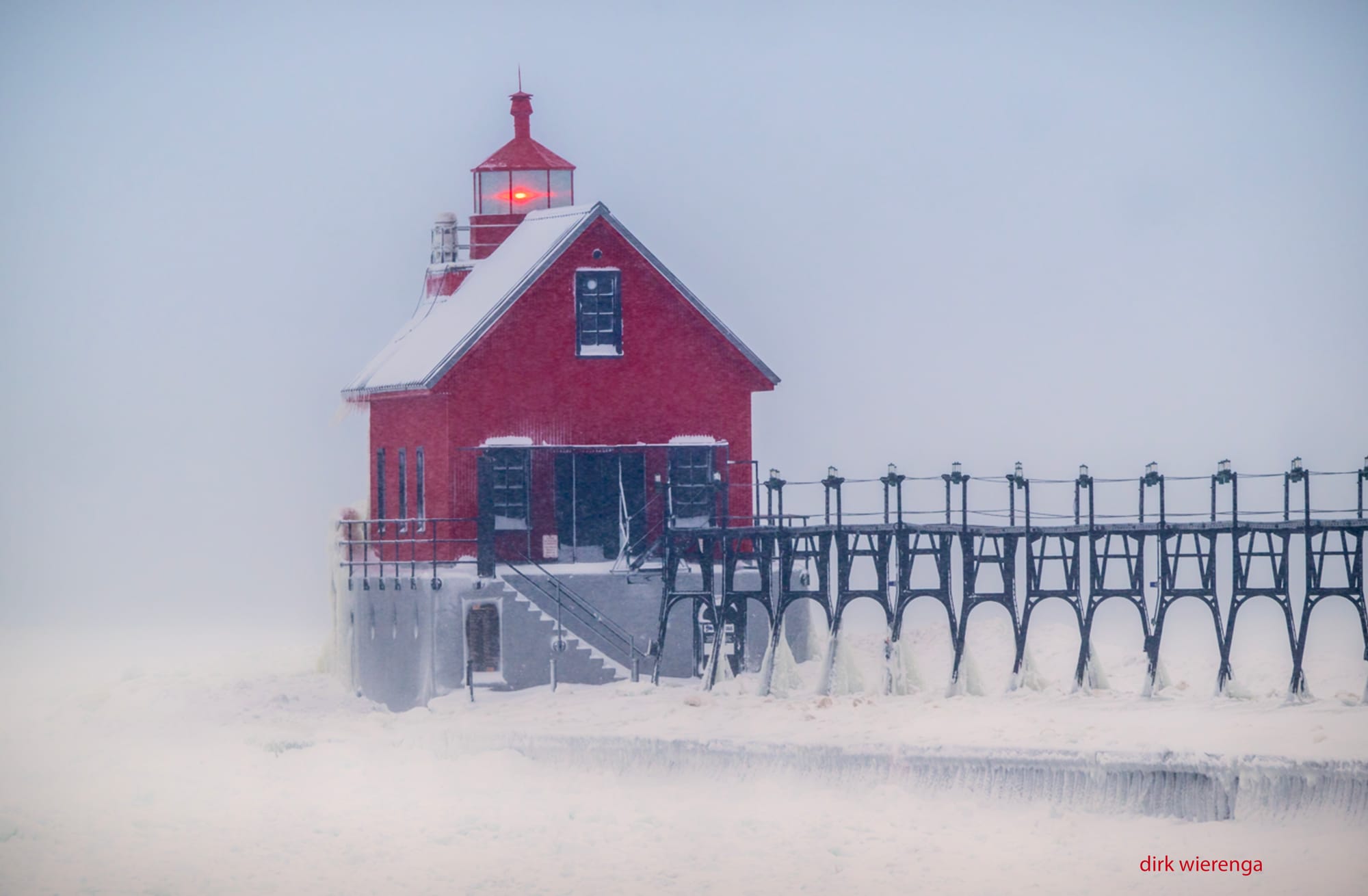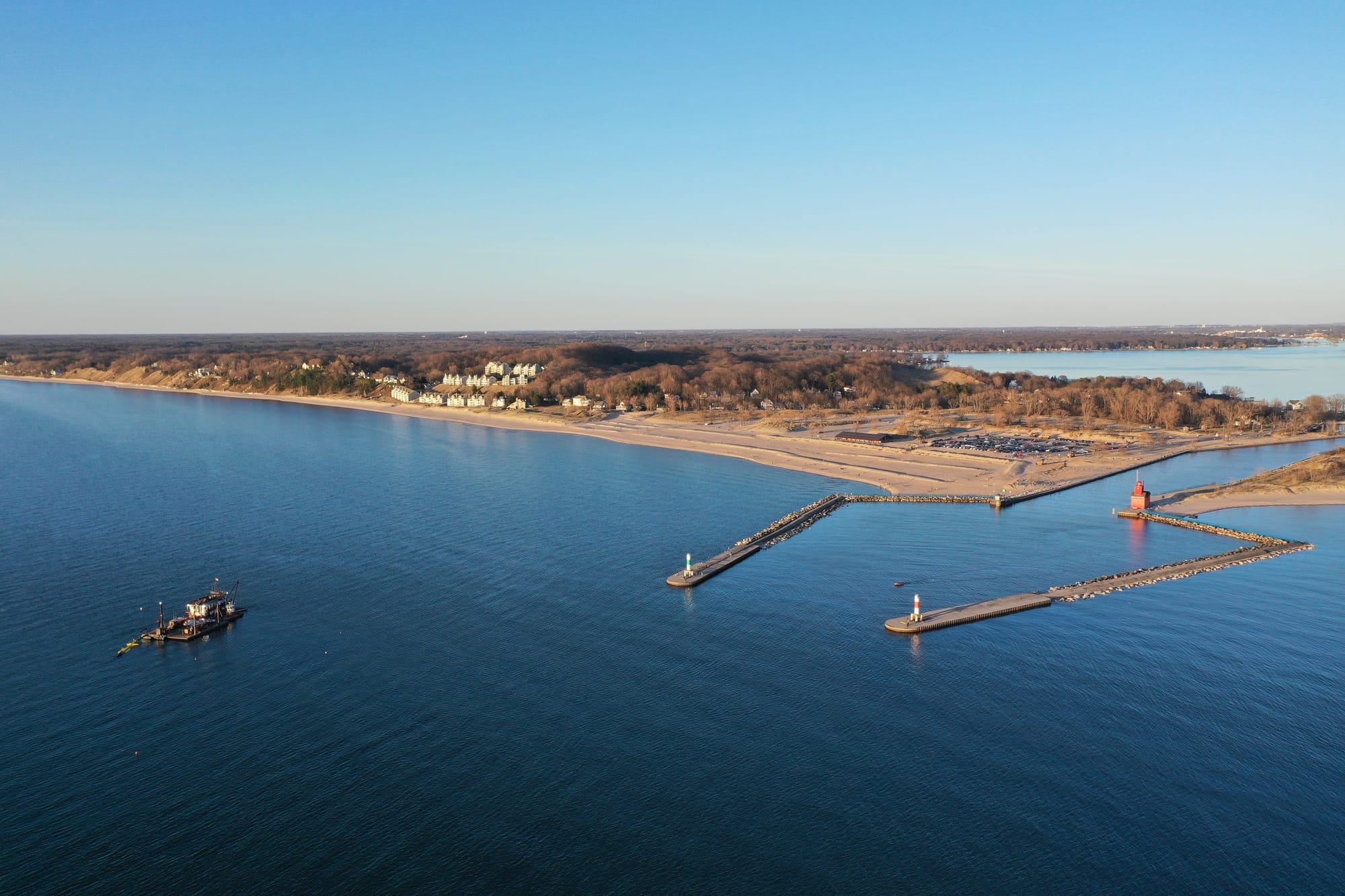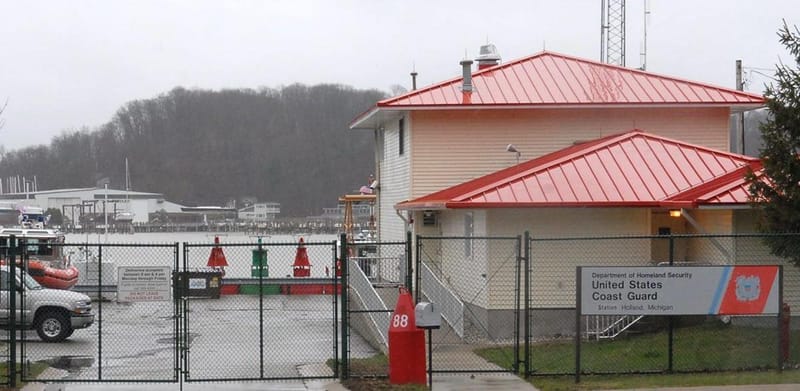Officials: Ottawa County harbor dredging delays over PFAS testing could drive up costs
Local, state and national officials are warning that unless Michigan environmental officials can fast-track PFAS regulations to allow for harbor dredging this year, it could end up costing Ottawa County residents millions.

OTTAWA COUNTY — Local, state and national officials are warning that unless Michigan environmental officials can fast-track PFAS regulations to allow for harbor dredging this year, it could end up costing Ottawa County residents millions.
The problem arose when the Michigan Department of Environment, Great Lakes and Energy (EGLE) implemented a new policy that requires testing for PFAS chemicals in sediment prior to being removed from federal harbors and channels.
The new requirement has caused confusion for the U.S. Army Corps of Engineers, which said it cannot proceed with dredging Ottawa County’s Grand Haven inner harbor until EGLE determines how PFAS will impact the silt and sediment to be dredged.
“EGLE has not been clear regarding the terms of this policy, the extent to which this policy change could disrupt harbors and shipping throughout our state and the Great Lakes system, the relevant PFAS thresholds and disposal requirements, and the timing of implementation,” said U.S. Rep. Bill Huizenga, who represents Michigan’s Fourth Congressional District, which includes the southern half of Ottawa County. “If these matters are not properly addressed, the communities I represent could face serious economic harm.”
How we got here
PFAS, or per- and polyfluoroalkyl substances, are a group of manmade chemicals used in various products and industries, including firefighting foams, stain repellents, and non-stick cookware.
Other sources can come from industrial sites, such as power plants, as in Grand Haven. The coal-fired J.B. Sims Plant, which closed in 2020 and was demolished in 2021, left coal ash on the site, which contains contaminants like mercury, cadmium, arsenic and PFAS.
Exposure in humans can lead to a range of health problems, including increased cholesterol, changes in the immune system, potential developmental delays and increased risk of certain cancers. There's also evidence suggesting a link between PFAS and thyroid disease, liver damage and reproductive issues such as decreased fertility.
As the chemicals became known to state environmental regulators — there are seven known PFAS sites in Ottawa County — policies were developed to help identify and monitor new contamination sites.
That led to a new policy from EGLE’s Water Resources Division in 2018 to require harbor sediment be tested for PFAS prior to dredging.
Dredging is the process of removing sediments and debris from the bottom of water bodies to maintain navigable waterways, deepen channels for larger vessels, and support various infrastructure projects.
The U.S. Corps of Engineers’ Detroit District maintains a navigation system of 81 harbors and channels on the Great Lakes. Some harbors, such as Muskegon, require annual dredging, while others, such as Grand Haven's inner harbor, might be dredged every two to four years, depending on factors such as river sediment accumulation, coastal erosion and water levels.
“We have to keep the channel dredged,” Grand Haven Mayor Bob Monetza told WGHN in April. “It gets full of sediment and gets shallow in places where boats can get hung up, or they might have to come in with lighter loads.”
The Grand River is typically kept at a depth of about 23 feet.
Every five years, harbors must apply for their Clean Water Act Section 401 Certification through the U.S. Environmental Protection Agency. Grand Haven was due to apply for its re-certification in November, but when the location was one of 17 harbors in Michigan identified with nearby PFAS-contributing sites — the former Sims site is about 2.5 miles from the outer harbor — EGLE implemented the new PFAS testing standard for the site.
“It kind of came out of nowhere, but they want us to start sampling the river bottom for PFAs, because there's PFAs in the river in the sediment that washes downstream from farther upstream,” Monetza told WGHN.
The "inner harbor" generally refers to the area closer to land, while the "outer harbor" is further from shore, where breakwaters or other structures are found to protect the harbor from strong waves and currents.
Meanwhile, the state has yet to establish PFAS standards for the sediment testing, causing confusion between the agencies about which levels are acceptable to allow dredging to proceed as well as who pays for the process.
Huizenga, in a letter to Michigan Gov. Gretchen Whitmer, said the Corps said at the Great Lakes Navigation meeting in November that the new testing requirements will reduce the number of harbors that are dredged annually and could drive up costs by up to 70%.
Standards for PFAS levels and disposal are still being circulated for review and have yet to be made available by the state. Even if the testing process is sorted out and performed, Monetza said it could take six months to a year to confirm the plan for Grand Haven.
“They'll take a long period of time to analyze and decide what they're going to do, what kind of permits they'll issue,” he said.
The Corps also announced it was pushing back the Grand Haven project until 2026, prompting deep concerns from local, state and federal officeholders.
“This is the equivalent of writing a speeding a ticket when there is no posted speed limit,” Huizenga, a Republican, said on his website.
Liz Wilkinson, operations manager at the Corps’ Grand Haven office, described the delay as “unlucky timing.”
“It was just kind of unfortunate, unlucky timing that Grand Haven needed to be coordinated right at about the time that EGLE felt like they were ready to start doing this testing with PFAS. We had it planned for this year. We had it budgeted for this year because we knew it was needed,” Wilkinson told The Grand Haven Tribune last month.
Officials warn of economic impacts
U.S. Rep. Hillary Scholten wrote a letter in April urging Whitmer of the economic impacts of not dredging Grand Haven’s harbor. The congresswoman, a Democrat, represents Michigan’s Third Congressional District, which includes the northern half of Ottawa County.
She said Grand Haven’s harbor is “an economic powerhouse” that supports over 450 jobs totaling $29.5 million in wages annually, as well as producing a regional impact of $88.8 million per year.
“A missed dredging cycle will come at a high price. Delays will directly affect our partners across the state who rely on materials to complete transportation projects and agriculture operations, with road-building materials, concrete, asphalt, and fertilizer expected to increase in cost by more than $1 million annually,” Scholten said in the letter.
She said lighter loads and more freighter trips will result in price hikes for consumers that could reach $3 to $5 million a year.
“If we see delayed dredging, goods being shipped through Grand Haven may increase in cost by roughly $3 to $5 million annually — costs that will likely be passed through to consumers,” Scholten wrote. “In the instance that Grand Haven becomes unnavigable for commercial vessels, it is understood that neighboring harbors do not have the capacity to accept those supplies.”
The Corps announced in April it was actually moving up the dredging schedule for Holland Harbor after a shoal — a submerged ridge or bank of sand or gravel that lies close to the water’s surface — developed over the winter across the entrance to the harbor, which could have caused the shipping industry to lose $1.4 million to $1.9 million per year due to ships having to carry lighter loads, according to WGVU Public Media.
King Co. Inc., based in Holland, will dredge about 12,400 cubic yards of sediment hydraulically. The project will cost $344,480 out of a three-project contract that also includes Grand Haven and St. Joseph harbors.

Ottawa County Commissioner Josh Brugger, who represents Grand Haven, Spring Lake and Ferrysburg, also wrote to Whitmer urging the state to find a solution.
Monetza, Spring Lake Mayor Richard Carlson, Spring Lake Township Supervisor Jerry Rabideau and Spring Lake Village President Mark Powers also signed onto Brugger’s message.
“We wish to underscore the message that, without a timely resolution, this major port cannot be maintained, and our local economy may be significantly harmed,” Brugger wrote. “We are appealing for your assistance to expedite the process.”
Scholten said time is of the essence.
“At a time of grave economic uncertainty and rising prices due to tariffs for the industries, we do not need to add to the increased production costs. This problem is still solvable,” she said. “When it comes to the shipping, construction, and agricultural industries, time is not a luxury we have.”
— Sarah Leach is the executive editor of the Ottawa News Network. Contact her at sleach@ottawanewsnetwork.org. Follow her on Twitter @ONNLeach.





